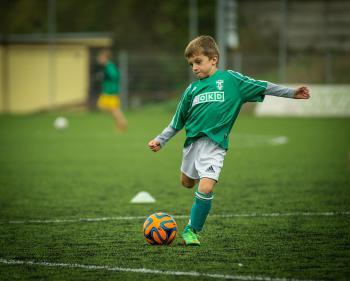
The development of good habits from childhood is very beneficial in the short and long term. Many of the problems suffered by youth can be eliminated or at least reduced in severity, if children acquire a range of healthy habits.
School failure is much less when children get used to striving and studying. Problems that have to do with eating, such as overweight and obesity, or the appearance of certain allergies, can also be prevented with healthy eating habits that have been instilled in the first ten years of life.
One of the healthiest customs we can promote in our children is the regular practice of sports activities. The performance of sports activities since childhood has very beneficial effects on the neuromotor development of children. Its visual and motor coordination, its proprioception and the functioning of a more efficient metabolism are encouraged.
At the bone and muscle level, and provided that sports activity does not involve excessive effort, the growth is healthier and the body's ability to recover from the effort made and even possible injuries is enhanced.
Sport also contributes to emotional, social and emotional development
The physical benefits of sport are obvious, but we should not ignore the benefits at other levels. For example, participation in team sports fosters social relationships, the ability to work in groups and empathy. On an emotional level, a more empathic child will have less difficulty in relating and better self-esteem.
In addition, emotionally, sport also generates many positive rewards. For example, although from our adult point of view we can believe that children's life is a paradise, our children cannot compare their routines with those of adults. They also get stressed, they can also suffer anxiety or anguish. And not only because the elderly with their problems can convey these feelings, but by their own problems and the dynamics in which they are involved in their daily routines.
Sports allow them an escape valve, an option in which to use their energy and relax. Something that adults know well and that works very similarly for our children.
Performing a sports activity also helps children sleep better. The effect of physical fatigue stimulates a greater need for rest, so that your sleep is deeper and that contributes to a better mental rest, something key to your emotional stability. We all know that tired children because they sleep poorly are more irascible and lazy children, with less ability to face their routines and duties.
That is why more and more parents and pediatricians emphasize how important it is to take care of this facet of child growth. There are many sports activities suitable for children, from children's sports to meditation, and that is that the benefits of Yoga for children have proven to be as interesting as for adults.
Lack of physical activity in children can cause visible problems, such as childhood obesity. But it is also necessary to understand that emotional health is as much or more important than physical health and that both are closely related.
An emotionally stable child has more guarantees of being a happy adult, who loves himself and, therefore, can have a better relationship with his environment and with others. The practice of a sporting activity is very beneficial to achieve that emotional balance at the same time as a strong and healthy body.
Article written by:
María José Madarnás, editora de Maternidad Fácil.
Source: FAROS Sant Joan de Déu
Barcelona, 22/12/2015
- Log in to post comments
